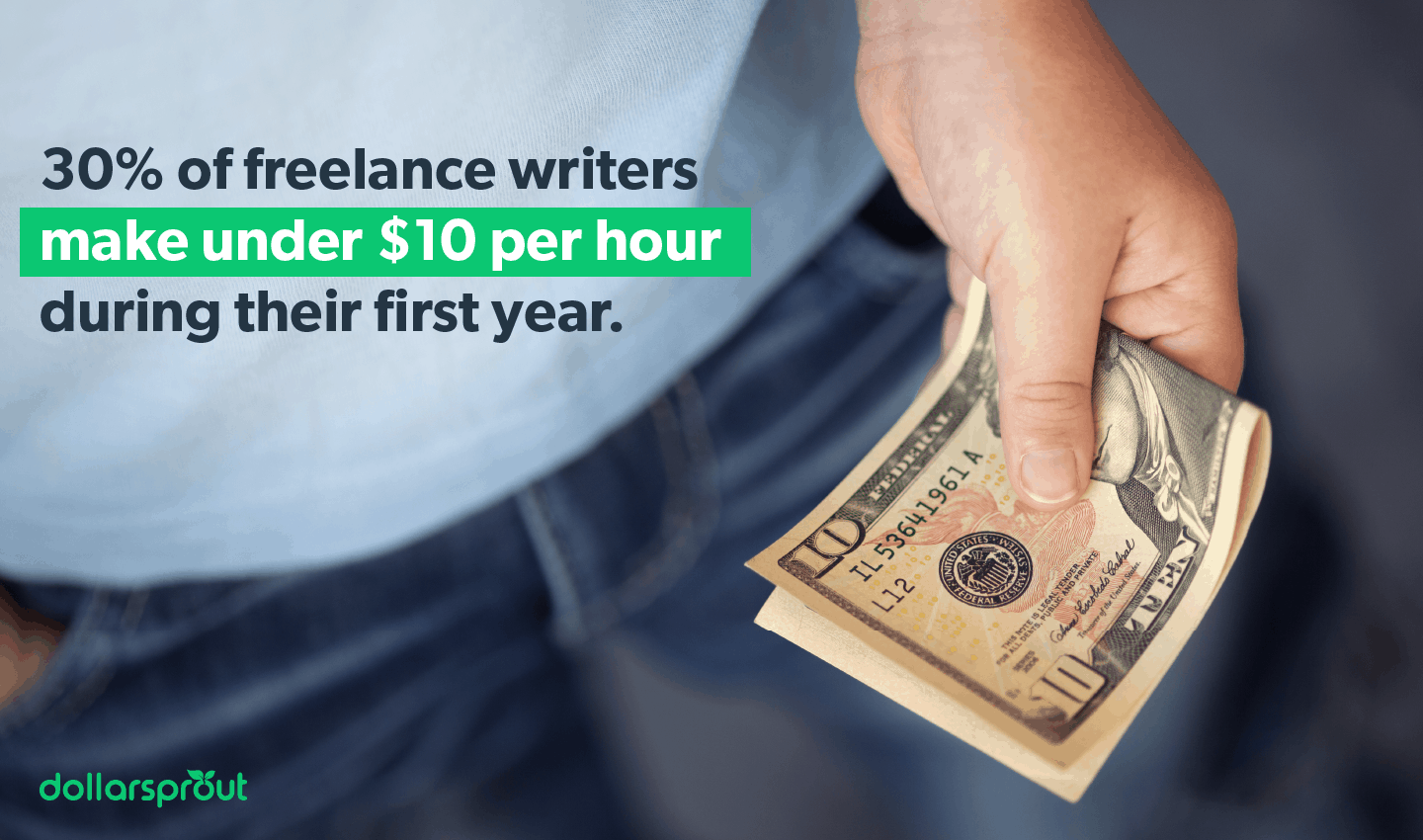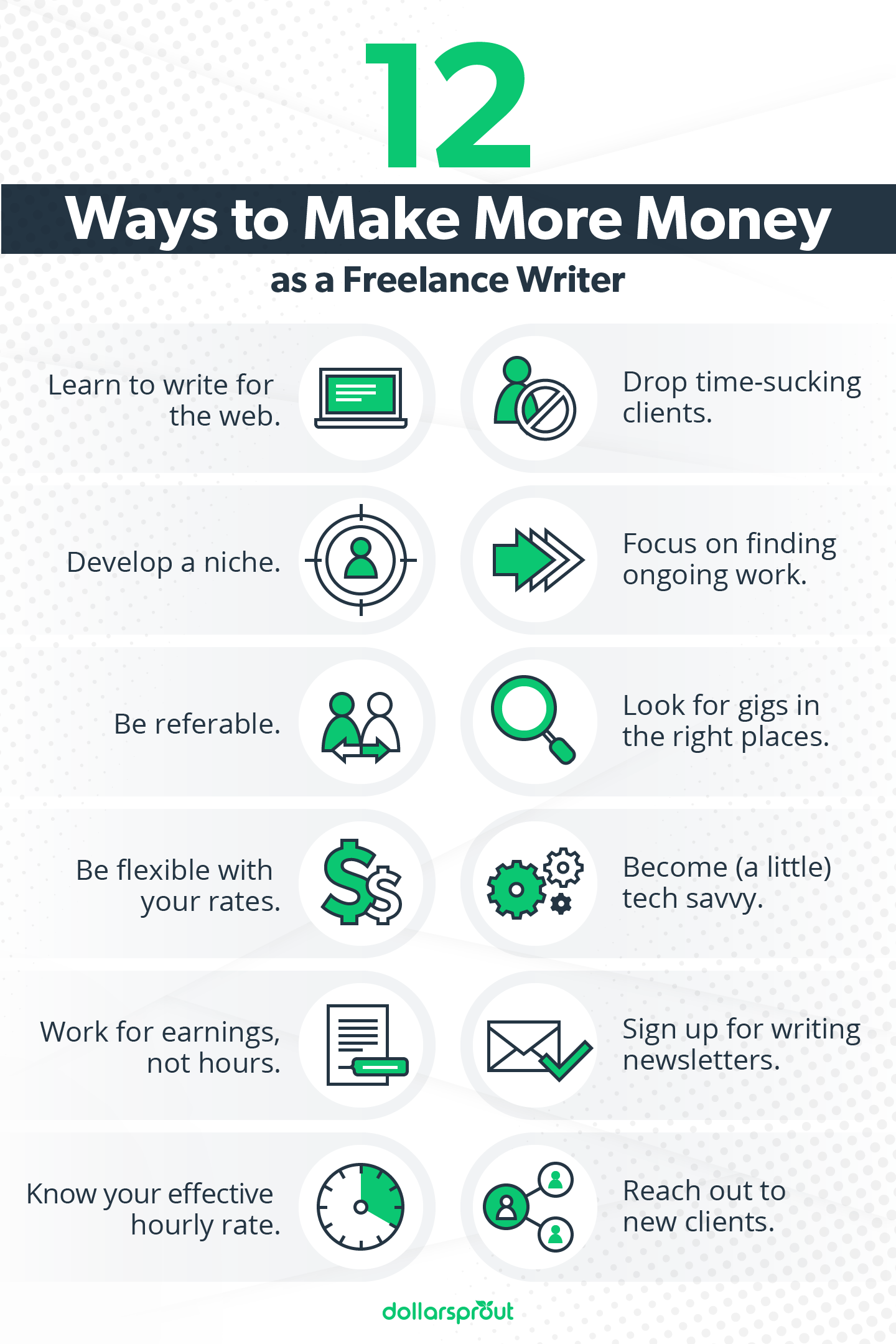12 Ways to Grow Your Income as a Freelance Writer
Our readers always come first
The content on DollarSprout includes links to our advertising partners. When you read our content and click on one of our partners’ links, and then decide to complete an offer — whether it’s downloading an app, opening an account, or some other action — we may earn a commission from that advertiser, at no extra cost to you.
Our ultimate goal is to educate and inform, not lure you into signing up for certain offers. Compensation from our partners may impact what products we cover and where they appear on the site, but does not have any impact on the objectivity of our reviews or advice.
Making more money as a freelance writer is about more than negotiating rates. If you’ve got the basics of being a freelancer down and are ready to make more money, try these steps that helped one writer earn 40% more per hour.

Our mission at DollarSprout is to help readers improve their financial lives, and we regularly partner with companies that share that same vision. If a purchase or signup is made through one of our Partners’ links, we may receive compensation for the referral. Learn more here.
I’ve been a freelance writer since 2011 — but I consider my first five years in the business a practice round because I was so unsuccessful.
I spent those years making low five figures annually. After I landed a full-time writing job, I was terrified to ever go back to freelancing for a living. I thought I was just bad at it. Then I got laid off.
In December 2019, I was suddenly without a job and only had about one freelance assignment every other month.
But this time, I kicked up my freelancing game — and went from making almost nothing to matching my full-time salary in less than 90 days.
12 Ways to Make More Money as a Freelance Writer
If you’ve got the basics of being a freelance writer down and are ready to make more money, try these steps that’ll boost your value and get clients knocking on your door.
1. Learn to write for the web.
Content marketing and online publishing drive some of the greatest demand for writers. Companies need writers for blog posts, social media, email marketing, e-books, and landing pages.
If your background is in print journalism or creative writing, bone up on how to write for online platforms, including search engine optimization (SEO) and social media, to vastly increase the gigs you qualify for.
Related: How to Generate Unlimited Blog Topics That People Actually Want to Read
2. Develop a niche.
I attribute a lot of my success gathering clients quickly to my focus on writing about personal finance, a sought-after niche. I’d worked full time for five years in the space, honing my expertise in complicated topics.
I initially didn’t want to niche down because I like writing about so many things. But labeling myself a “personal finance writer” and leaning into my greatest knowledge base helps me attract clients searching for that expertise. It also helps my network think of me for referrals.
Finance, health, and law are all lucrative niches that always seem to have open writing opportunities. They each cover complex topics that have a major impact on readers’ lives, so expertise from writers and editors is crucial.
I don’t have a certification, such as a Certified Financial Planner™ or CPA, but those would add authority and boost your value as a niche writer. Legal blogs often want to see a law degree or education in addition to experience writing about law.
3. Be referable.
Through full-time jobs and freelance side gigs over the years, I developed strong relationships with editors and fellow writers.
Networking has never been my strong point. I developed relationships instead of the strength of my work — I turned in clean copy, met deadlines, and proposed good ideas. When my friends and colleagues knew I was available for work, they were happy to refer me to clients and pass opportunities my way.
No matter how much you’re getting paid for your work now, put your full effort behind it. Showing up and doing a killer job will set you up to see referrals roll in — so you can eventually be picky and feel confident negotiating higher rates.
4. Be flexible with rates.

Setting freelance rates is a complicated dance. I set my initial target somewhat arbitrarily, based on what I knew from colleagues and freelance writers I’d worked with as an editor. It was pretty high, and I turned down a few offers from prospects who couldn’t match it.
But then I got an offer from a site I knew I’d enjoy writing for. It offered a set rate to all freelancers — half my target per-word rate. But it also had endless opportunities for assignments, so I’d spend less time pitching and seeking new work.
A low rate with the promise of abundant work could be more lucrative than a high rate for one-off or sporadic assignments you have to spend unpaid time securing. Build that difference into your rates to avoid turning down good opportunities that don’t fit your stringent standards.
5. Work based on earnings, not hours.
You can plan your days as a freelancer in a few ways:
- By time: Commit to working 9 a.m. to 5 p.m. (or any set number of hours). Stop at quitting time, even if you’re in the middle of a project, and resume the next day.
- By tasks: Create a to-do list for the day, and work until you check everything off.
- By earnings: Aim for an average daily dollar amount, and work until you’ve earned it.
I plan my days based on earnings because it helps me earn the most and consistently increase my earnings without increasing my hours or workload.
Working toward a dollar amount each day helps me prioritize work, and it helps me quickly see when I need to rebalance my workload by dropping over-taxing clients and reaching out to new prospects.
Related: How to Maximize Your Productivity and Earnings as a Freelancer
6. Do some math.

This was one of the most important steps I took to boost my income by 70% in my third month back at freelancing. Early on, I was doing a lot of content management work that filled up to 20 hours per week, and I was doing a few writing assignments to fill in the rest.
Tracking the hours spent on each project helped me quickly see that writing had a much better ROI.
Keep track of the time you spend on each project to know your effective hourly rate. You’ll see which projects are earning you money and which are sucking your time.
To set a target hourly rate, a good rule of thumb is to double your full-time hourly rate. If you’re aiming for an annual salary of $50,000, the hourly rate at a full-time job would be about $24. Aim for about $48 per hour freelancing.
You have to aim for more as a freelancer because you don’t get paid for every hour you work. You spend tons of non-billable hours on tasks like writing pitches, researching publications, searching job boards, writing proposals, meeting with prospects, or networking.
When you’re self-employed, you also have to pay more taxes and buy your own health insurance if you don’t have a spouse who can provide coverage.
Related: The Best Online Writing Courses for New Freelance Writers
7. Drop time-sucking clients.
After realizing I could earn more on writing than on content management, I fired a client that had commanded a ton of my time for a low hourly rate.
When I filled that time with other clients, my hourly rate jumped about 40%. That meant I could earn more money and work fewer hours. I was hesitant to lose that client, who promised as much work as I wanted, but I knew I could make better use of my time.
Be aware of inefficient work that sucks a lot of time you could spend on more lucrative work; and don’t be afraid to drop clients for better opportunities.
Notice clients who waste your time with non-billable work — the ones who require complicated invoicing, email you at odd hours, micromanage every assignment, expect several rounds of revisions, or are generally disorganized. Account for that extra time when figuring out the hourly rate you earn for that client’s projects.
Related: 29 Best Work-From-Home Jobs for 2024
8. Don’t rely on pitches.
My biggest mistake in my first stint as a freelancer was thinking pitching was the only way to get work.
Sending a one-off pitch is a great way to get an assignment at a high-end magazine or newspaper, or at blogs as a new writer. But it’s a laborious way to make a living writing.
Focus on finding clients that offer ongoing writing work and want a long-term relationship. Small businesses often work this way, as do niche sites that require expertise, like finance, health, or legal blogs.
Or turn one-off assignments into ongoing gigs by doing a great job.
Follow up after one successful assignment with another pitch. Once an editor knows how great you are, let them know you’re available to accept assignments. Most sites have a wish list of articles they’d like written, and they’ll be happy to pass them your way once you’ve proven yourself reliable.
Related: Meet the Journalism Dropout Making Six Figures as a Freelance Writer
9. Look for gigs in the right places.
As a new freelancer, you might have relied on broker sites like Upwork and Textbroker to find places to get paid to write. But clients on those sites are often looking for the cheapest hire and aren’t as concerned with quality.
Now that you have more experience, you have better options to find freelance jobs:
- Browse higher-quality job boards, like MediaBistro, JournalismJobs.com, and Mediagazer.
- Host a portfolio and “work with me” page on your own website, and link to it from your social media profiles to help clients find you.
- Join membership groups of writers, like Freelance Writers Den, Editorial Freelancers Association, or Society of Professional Journalists, which host vetted job boards and let you list yourself as available for hire.
- Use your network and make sure colleagues who love your work know you’re available, so they can send prospects your way. Try to return the favor when you can.
- Join freelance writer groups on Facebook, like The Freelance Content Marketing Writer and The Write Life, where editors post quality opportunities.
10. Become (a little) tech-savvy.
Being easy to work with will make you more valuable to clients — and a little tech savviness makes you less of a headache than someone clients have to handhold with every new piece of software.
Learn how to use basic tech you’ll encounter as a freelancer, including:
- Video conferencing: Google Hangouts and Zoom.
- Project management: Trello and Asana.
- Word processing and collaborating: Microsoft Word and Google Docs.
- Content management: WordPress (and Wix for some small businesses).
11. Subscribe to writing newsletters.
Newsletters for writers are a simple way to stay abreast of writing gigs without constantly perusing job boards. Plus, they usually come with tons of writing tips.
My favorite newsletters with unique writing gigs are:
- FundsforWriters by C. Hope Clark.
- Where to Pitch by Susan Shain.
12. Reach out to new clients.
When you’re a new writer, it can be easy to rely on job boards or Facebook posts to find new clients, but you can make more money if you find clients on your own.
Use sites like Crunchbase to find startups in your field. Send emails to them explaining what you offer and how you can help grow their business with your writing.
Set a calendar reminder to follow up within a few months with a quick check-in and a link to your latest article.
Following up is key, even if you never hear back or only receive a lukewarm response. You never know when a company will be ready for freelance help. It could be six months or a year from now.
Related: How to Get Paid to Write Reviews
Kick Up Your Earning Potential
Making more money as a freelance writer is about more than knowing how to negotiate higher rates. A little organization, strategy, and good work will give you a serious boost, even if you never have a conversation about money.
Increase your value by focusing on a niche and proving your quality and work ethic to colleagues. Avoid low-rate job boards, and seek jobs through industry groups, vetted listings, and network referrals.
Even though it can be tedious, try to track your work. Understanding how much your time is worth is the first step to figuring out how to get more out of it.








